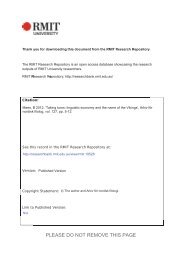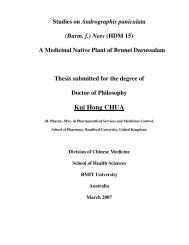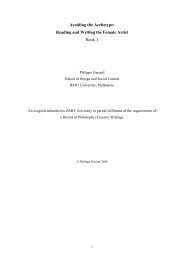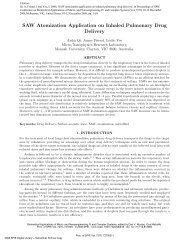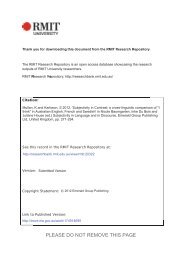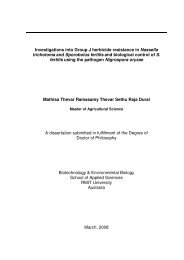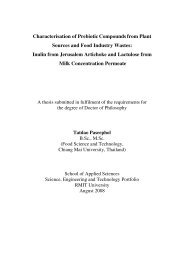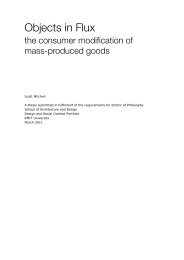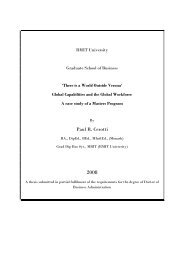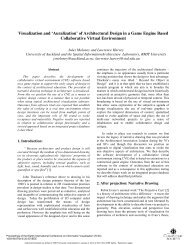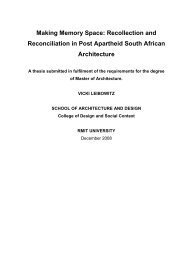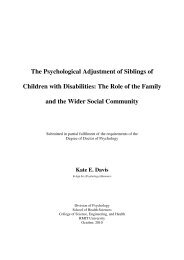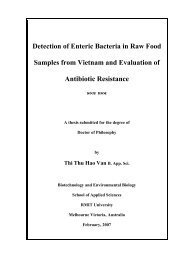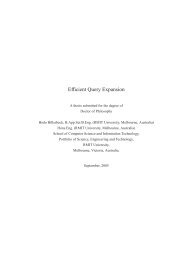- Page 1 and 2: Eating Disorders and Obsessive-Comp
- Page 3 and 4: Acknowledgments I would like to sin
- Page 5 and 6: Table of Contents Declaration of Au
- Page 7 and 8: Media releases…………………
- Page 9 and 10: Results………………………
- Page 11 and 12: Appendix D DSM-IV-TR Diagnostic Cri
- Page 13 and 14: Table 12 Mean and Standard Deviatio
- Page 15 and 16: Figure 12 Effect size for the Mann-
- Page 17 and 18: LEDBs: Lifetime Eating Disorder Beh
- Page 19 and 20: psychopathology. Each participant c
- Page 21 and 22: Chapter 1 Introduction and Aims of
- Page 23 and 24: ehaviours and whether these beliefs
- Page 25 and 26: Jones, Fox , Babigan, & Hutton, 198
- Page 27 and 28: The course of EDNOS varies greatly
- Page 29 and 30: disorder behaviours (LEDBs) among a
- Page 31: Further support for these findings
- Page 35 and 36: Chapter 3 Eating Disorders and Obse
- Page 37 and 38: not related to food, body shape, or
- Page 39 and 40: compared with the 2% to 3% reported
- Page 41 and 42: (Channon & DeSilva, 1985). These fi
- Page 43 and 44: Empirical evidence for this content
- Page 45 and 46: checking may be related to neutrali
- Page 47 and 48: Perfectionism/Intolerance of Uncert
- Page 49 and 50: with OCD or another anxiety disorde
- Page 51 and 52: Perfectionism and Inflated Responsi
- Page 53 and 54: perfectionism in women was related
- Page 55 and 56: elationship emerged when the patien
- Page 57 and 58: chance, inconclusive). Results indi
- Page 59 and 60: Shafran (2002) reports on an experi
- Page 61 and 62: disorders (Meyer et al., 2000). Tho
- Page 63 and 64: overestimation of threat differs bo
- Page 65 and 66: suicide attempts. As such, further
- Page 67 and 68: and BN will report obsessive-compul
- Page 69 and 70: 3. After controlling for general sy
- Page 71 and 72: Participants Chapter 5 Method Overv
- Page 73 and 74: adolescence and early adulthood (Am
- Page 75 and 76: detailed description of the psychop
- Page 77 and 78: Demographics questionnaire. A brief
- Page 79 and 80: anging from .81 to .94 for the four
- Page 81 and 82: acceptable intercorrelations among
- Page 83 and 84:
Responsibility/Overestimation of Th
- Page 85 and 86:
checking, validity data is still ac
- Page 87 and 88:
depression, anxiety, and less accep
- Page 89 and 90:
University. Provided permission was
- Page 91 and 92:
publications (e.g., Medical Search
- Page 93 and 94:
information provided would remain p
- Page 95 and 96:
Chapter 6 Data Preparation, Screeni
- Page 97 and 98:
the violation. If a marked violatio
- Page 99 and 100:
These guidelines have been incorpor
- Page 101 and 102:
history of this disorder. By compar
- Page 103 and 104:
Regarding the length of treatment,
- Page 105 and 106:
espect to extreme dietary restraint
- Page 107 and 108:
Criteria used to categorise the Obs
- Page 109 and 110:
It should be noted that a proportio
- Page 111 and 112:
Table 3 Demographic Characteristics
- Page 113 and 114:
the time of the study. When compare
- Page 115 and 116:
Results Eating Disorder Symptom Com
- Page 117 and 118:
Women with an eating disorder repor
- Page 119 and 120:
Eating Disorder Behaviours Across C
- Page 121 and 122:
As shown, women with an eating diso
- Page 123 and 124:
Approximately 80% of participants i
- Page 125 and 126:
All correlations were found to be s
- Page 127 and 128:
Women with OCD had significantly hi
- Page 129 and 130:
Small Medium Large Based on the fin
- Page 131 and 132:
violation in the homogeneity of var
- Page 133 and 134:
As shown, participation in one, two
- Page 135 and 136:
Small Medium Large Small to medium
- Page 137 and 138:
Participants in the community contr
- Page 139 and 140:
eating disorder engaged in substant
- Page 141 and 142:
disorder, those with OCD have more
- Page 143 and 144:
dietary restraint when compared wit
- Page 145 and 146:
study, investigation of the relatio
- Page 147 and 148:
Results Correlations Between Eating
- Page 149 and 150:
Correlations between the EDE-Q and
- Page 151 and 152:
As shown in Table 10, all univariat
- Page 153 and 154:
which indicates an exceptionally hi
- Page 155 and 156:
Accounting for the effects of obses
- Page 157 and 158:
Responsibility/Threat Estimation, t
- Page 159 and 160:
disorder and depression groups on R
- Page 161 and 162:
studies have compared community con
- Page 163 and 164:
that across eating disorder categor
- Page 165 and 166:
eating, shape, and weight domain. R
- Page 167 and 168:
would be similarly related on the b
- Page 169 and 170:
Of the 31 items, nine loaded on Fac
- Page 171 and 172:
thus obtaining a measure of interna
- Page 173 and 174:
Table 15 Item Analysis for the Four
- Page 175 and 176:
A strong association was found betw
- Page 177 and 178:
Table 17 Correlation Matrix for the
- Page 179 and 180:
Running head: EATING DISORDERS AND
- Page 181 and 182:
Table 19 Correlation Matrix for the
- Page 183 and 184:
Table 20 Correlation Matrix for the
- Page 185 and 186:
F subscales. OBQ-EDV Perfectionism
- Page 187 and 188:
etween Perfectionism and Intoleranc
- Page 189 and 190:
loading on individual factors and a
- Page 191 and 192:
BCQ subscales in the realms of .50
- Page 193 and 194:
associated with weight gain, a need
- Page 195 and 196:
no diagnostic history also being co
- Page 197 and 198:
As shown, group differences emerged
- Page 199 and 200:
Comparison of Eating Disorder Diagn
- Page 201 and 202:
Independent Variable Mediator Depen
- Page 203 and 204:
Beta weights and corresponding p-va
- Page 205 and 206:
the community control group across
- Page 207 and 208:
Comparison of Eating Disorder Diagn
- Page 209 and 210:
eliefs presents an ominous picture
- Page 211 and 212:
eliefs in eating disorders lies in
- Page 213 and 214:
eliefs have several overlapping fea
- Page 215 and 216:
obsessions and preoccupations stem
- Page 217 and 218:
score higher on the OBQ-EDV total s
- Page 219 and 220:
scores of equal severity on the OBQ
- Page 221 and 222:
Theoretical Implications The curren
- Page 223 and 224:
Despite this, findings of the curre
- Page 225 and 226:
or the sense of inflated responsibi
- Page 227 and 228:
any qualitative assessments with pa
- Page 229 and 230:
Recommendations for Future Research
- Page 231 and 232:
necessary to provide a more concret
- Page 233 and 234:
References Abramowitz, J. S., & Dea
- Page 235 and 236:
Binford, R. B., & le Grange, D. (20
- Page 237 and 238:
Collings, S., & King, M. (1994). Te
- Page 239 and 240:
Fairburn, C. G., & Beglin, S. J. (1
- Page 241 and 242:
Garner, D. M., Olmstead, M., & Poli
- Page 243 and 244:
Halmi, K. A., Eckert, E., Marchi, P
- Page 245 and 246:
Hudson, J. I., Pope Jr., H. G., Yur
- Page 247 and 248:
Lucas, A. R., Beard, C. M., O’Fal
- Page 249 and 250:
compulsive symptoms. Journal of Anx
- Page 251 and 252:
Paxton, S. J., Shelton, B., & McLea
- Page 253 and 254:
Rothenberg, A. (1986). Eating disor
- Page 255 and 256:
Simonds, L. M., Thorpe, S. J., & El
- Page 257 and 258:
Tolin, D. F., Worhunsky, P., & Malt
- Page 259 and 260:
Williamson, D. A., Gleaves, D. H.,
- Page 261 and 262:
A. Appendix A DSM-IV-TR Diagnostic
- Page 263 and 264:
Appendix C DSM-IV-TR Diagnostic Cri
- Page 265 and 266:
C. D. 245 The obsessions or compuls
- Page 267 and 268:
18. Even if gaining weight is very
- Page 269 and 270:
1 st February 2008 Adrian Schembri
- Page 271 and 272:
Appendix G Plain Language Statement
- Page 273 and 274:
and weight will be investigated as
- Page 275 and 276:
October 10, 2008 Appendix H Letter
- Page 277 and 278:
Appendix I Sources of Recruitment E
- Page 279 and 280:
259
- Page 281 and 282:
261
- Page 283 and 284:
Eating disorder study examines wome
- Page 285 and 286:
Appendix M Copy of the May, 2009 Me
- Page 287 and 288:
• About one-third regularly used
- Page 289 and 290:
INVITATION TO PARTICIPATE IN A RESE
- Page 291 and 292:
271 welcome to contact Dr David Smi



